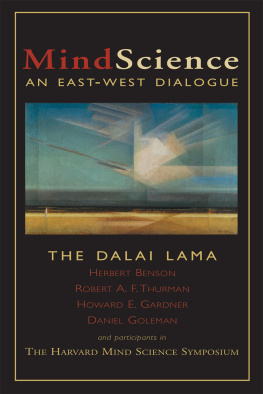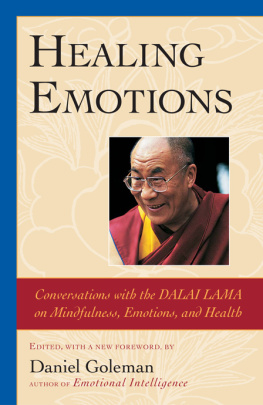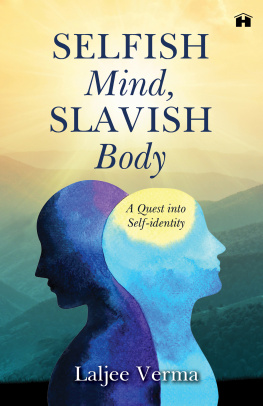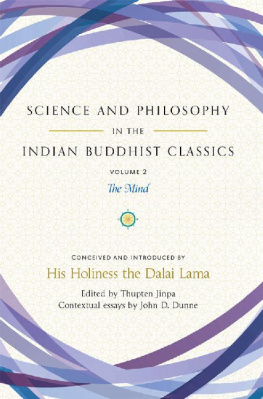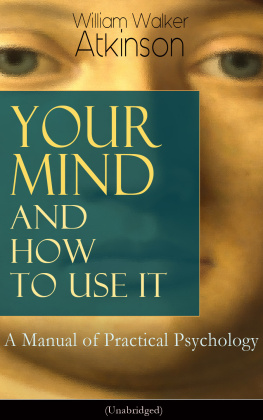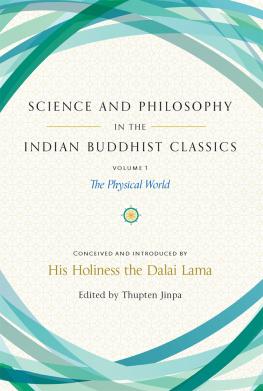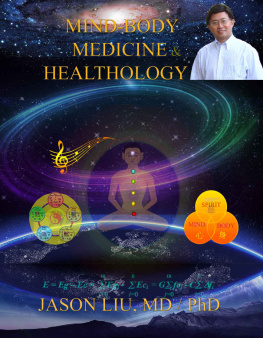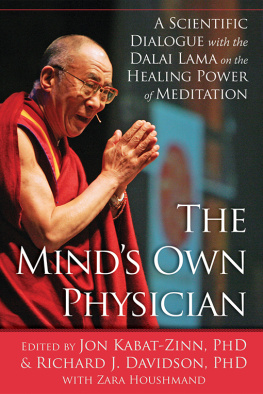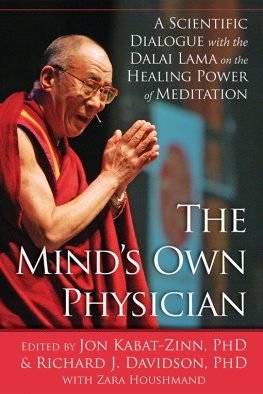Mind Science

Wisdom Publications
199 Elm Street
Somerville, Massachusetts 02144 USA
www.wisdompubs.org
Mind/Body Medical Institute Inc. & Tibet House New York Inc. 1991;
Chapter 4 Robert Thurman 1991
Illustrations Fig. 1 Robert Beer 1991;
Figs. 2 & 3 Venerable Pema Losang Chogyen 1991
All rights reserved.
No part of this book may be reproduced in any form or by any means, electronic or mechanical, including photocopying, recording, or by any information storage and retrieval system or technologies now known or later developed, without permission in writing from the publisher.
Library of Congress Cataloging-in-Publication Data
MindScience: An East-West Dialogue
His Holiness the Dalai Lama et al.
edited by Daniel Goleman and Robert Thurman.
p. cm.
Talks delivered on March 24, 1991, at symposium called Mind Science, part of the continuing education program of Harvard Medical School.
Includes bibliographical references and index.
ISBN 0 86171 066 5
I. BuddhismPsychologyCongresses.
2. MeditationPhysiological aspectsCongresses.
3. MeditationBuddhismCongresses.
I. Bstan-dzin-rgya-mtsho, Dalai Lama XIV, I935.
II. Goleman, Daniel. III. Thurman, Robert A. F.
IV. Harvard Medical School.
BQ4570. P76M57 1991
294.3375dc20 91-30288
11 10 09 08 07
11 10 9 8 7
Cover design by TLrggms
Cover painting: Bird Cloud, 1926, by Lyonel Feininger, courtesy of the Busch-Reisinger Museum, Harvard University Art Museums, purchased in memory of Eda K. Loeb.
Wisdom Publications books are printed on acid-free paper and meet the guidelines for permanence and durability of the Committee on Production Guidelines for Book Longevity of the Council on Library Resources.
Manufactured in the United States of America.
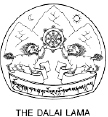
I believe the ultimate aim of all human beings is to obtain happiness and a sense of fulfillment. These objectives can be achieved through physical amenities and proper mental development, but the dominant and ultimate factor is the mental aspect. In order to achieve these objectives one must have knowledge about both mind and matter.
Science has made tremendous progress in understanding and harnessing matter. Buddhism, on the other hand, has a profound philosophy and over the centuries has developed a systematic method of shaping and developing the mind. Whether we are scientists or spiritual practitioners our basic needs and aspirations are the same. Scientists may study mainly matter but they cannot ignore the human mind, or consciousness; spiritual practitioners may be engaging mainly in developing the mind but they cannot completely ignore their physical needs. It is for this reason that I have always stressed the importance of combining both the mental and the material approach to achieving happiness for humankind. I am therefore very happy to learn that Wisdom is publishing this book MindScience.

August 5, 1991
The talks published here were originally delivered at a symposium called Mind Science: A Dialogue between East and West. Part of a program of Harvard Medical Schools Department of Continuing Medical Education, the symposium took place on March 24, 1991, at the Kresge Auditorium, Massachusetts Institute of Technology, Cambridge, under the joint auspices of the Mind/Body Medical Institute and Tibet House New York. It gathered together experts from the fields of medicine, psychiatry, psychobiology, neurobiology, education, comparative religion, and Indo-Tibetan Buddhism in open dialogue and exchange on the various concepts, approaches, and understandings, East and West, of the science of mind. Guest of honor was His Holiness the Dalai Lama, the Nobel Peace Prize Laureate.
The symposium celebrated more than a decade of collaborative research between the Tibetan Buddhist community and Harvard Medical School. This work had its genesis on October 18, 1979, when I met with His Holiness the Dalai Lama during his first visit to Harvard University. On this occasion, I had explained our laboratorys experiments on the physiological effects of simple meditative techniques, and requested permission to study several of the advanced meditative techniques of Tibetan Buddhism.
The rationale was straightforward: If simple meditative techniques resulted in such notable physiological changes as decreased metabolism, heart rate, blood pressure, and rate of breathing, as well as distinctive brainwave patterns, what could the effects of advanced meditative techniques be? Could they possibly demonstrate even more striking mind/body interactions? We had been attempting to investigate these advanced techniques for several years, but could find no practitioners who would consent to be studiedthey had little interest in the scientific documentation of their practices.
I had just finished reading Alexandra David-Neels Magic and Mystery in Tibet, which contained her early-twentieth-century accounts of tumo yoga being performed by Tibetan Buddhist monks. In this practice, an internal heat, which is generated for religious purposes, has demonstrable effects on the body. David-Neel described what she saw in a midwinter encounter:
The neophytes sit on the ground, cross-legged and naked. Sheets are dipped in the icy water, each man wraps himself in one of them and must dry it on his body. As soon as the sheet has become dry, it is again dipped in the water and placed on the novices body to be dried as before. The operation goes on [in] that fashion until daybreak. Then he who has dried the largest number of sheets is acknowledged the winner of the competition.
Besides drying wet sheets on ones body, there exist various other tests to ascertain the degree of heat which the neophyte is able to radiate. One of these tests consists in sitting in the snow. The quantity of snow melted under the man and the distance at which it melts around him are taken as measures of his ability.
I hoped that with the permission of His Holiness the Dalai Lama, I would be allowed access to study the remarkable alleged mind/body effects of tumo.
Our October 1979 meeting took place in the living room of the Dana-Palmer House in Cambridge, an 1823 building in which William James had lived and where he is believed to have conceived his idea of a pluralistic universe. After I had explained my rationale for requesting to study practitioners of tumo, His Holiness replied, It will be very difficult to measure these abilities. The people who practice this meditation do so for religious purposes. It must be experienced in order to feel the benefits. You must experience it first. Then he added, Still, our culture is undergoing many changes. We have been forced out of our homeland into exileperhaps there is some worth in allowing this study to be done.
Several months later I received a letter from His Holinesss office inviting us to study three tumo practitioners who lived near Dharamsala, India. Some of the successful and striking results of these studies and others are described in this book. We determined through scientifically based investigations that advanced meditative techniques do indeed lead to profound, hitherto unrecognized human mind/body capacities.

